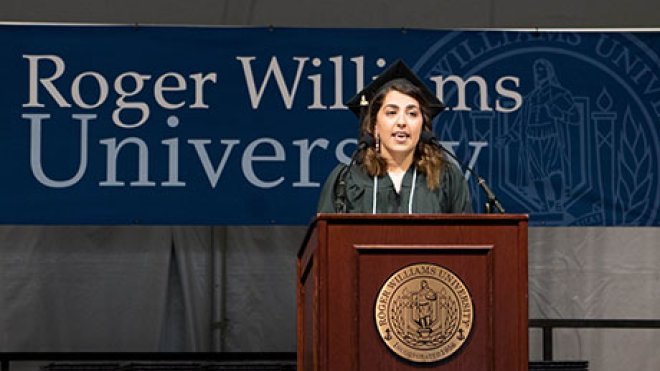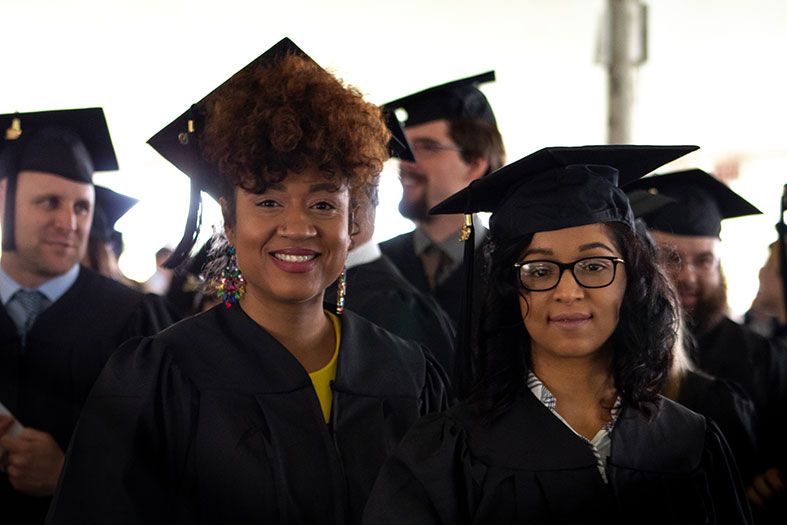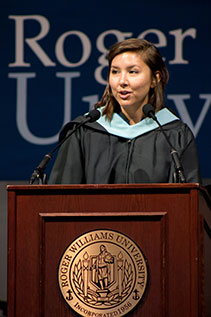Class of 2019 Graduate Students Urged to “Make a Difference”
In RWU’s first annual Graduate Commencement, speakers challenge graduate students to change the world

BRISTOL, R.I. – They’ve spent countless hours conducting deep research, presented their scholarship at academic conferences, partnered with local communities to address real problems, and dedicated themselves to humanitarian work and social justice issues. Now, it’s their turn to celebrate their remarkable accomplishments and receive their hard-earned degrees.
On Friday May 17, graduate students commemorated the tradition of crossing the commencement stage to receive their graduate hoods and degrees in the first annual Roger Williams University Graduate Commencement ceremony. At the ceremony, the 157 members of the Class of 2019 came together to create one more meaningful memory as they joined hundreds of attendees to culminate their graduate careers.
“You have all had to work very hard to gain the knowledge, skills and habits of mind particular to your field of study or the profession you’re about to enter, and you should be very proud of having done so,” said RWU Interim President Andrew Workman, urging graduates to continue learning throughout their lives. “My charge to you is to moderate your well-earned sense of competence and confidence to the degree necessary to remain open to change, to difference, to ambiguity, even as you hold fast to the core values of your chosen field.”
 The keynote address was presented by Rebekah Snyder, who received a master’s degree in forensic psychology from RWU in 2016 and who served as the victim advocate for the Michigan attorney general’s office in the sexual abuse case involving USA Gymnastics doctor Larry Nassar.
The keynote address was presented by Rebekah Snyder, who received a master’s degree in forensic psychology from RWU in 2016 and who served as the victim advocate for the Michigan attorney general’s office in the sexual abuse case involving USA Gymnastics doctor Larry Nassar.
Snyder had arrived at RWU “with an intense desire to change the world” and gained the preparation she needed in the classroom, hands-on practicum opportunities, and in a graduate assistantship with the RWU Office of Student Conduct and Community Standards, where she acquired her first professional experience working on Title IX and sexual misconduct cases, a precursor to the career she was about to start as a victim advocate.
Setting out to do work that changes lives can be daunting, time-consuming and stressful, she told graduates, so be sure to develop a support system of family and friends, like the ones she made at RWU and leans on personally and professionally.

“Don’t ever underestimate your impact and ability to change the world and culture around you,” she said. “You are here to make a difference – hold onto that desire to make a difference and the rest of your life, the rest of your work, will follow.”
In her address as student commencement speaker, Amelia Tayeh told graduates to remember that while they have put in long hours of hard work to reach this pinnacle in their academic journey, to still know that “anything is possible.”
“No matter where we go from here, we will face even more challenges, but we are lucky to have the knowledge and skills required,” said Tayeh, who received a Master of Architecture with an Urban and Regional Planning Certificate. “Most importantly, we are all here today because we had a vision and never gave up on ourselves.”
For her graduate thesis, Tayeh, who calls both the United States and Lebanon home, decided to bring together her academic studies and passion for social justice activism. She redesigned tents for refugee camps to create more humane environments for the millions seeking shelter from war-torn countries, while using her architectural vision to raise awareness for the toll the refugee crisis is taking on displaced families. In December, she constructed a visual representation of her concept in the center of the Bristol campus, where people could enter the tents, painted with the word “refuge” in multiple languages, and listen to a documentary about Syrian refugees.
“Our world is what we create and our limits are not built upon the constructs that we think define us,” she said. “Challenge the world that has been created around us and envision a better one. Challenge the minds that think they have thought for us, and question them. Challenge yourself to see past what you know and venture into the world yet discovered.”